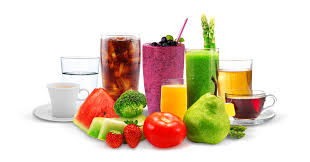
Rehydration is not always easy, depending on your level of dehydration it could take more than added a simple glass of water. Severe dehydration is commonly treated in the hospital through intravenous drips containing electrolytes and high fluid levels. Depending on the severity, one may need to stay on this feed constantly for several days. However severe dehydration is not the most common form of dehydration which is what I am writing this post about. Dehydration is not always severe, but as stated in previous posts, even just a 1% drop in body weight due to fluid loss leads to many problems. I know that it is not always easy to stay hydrated and that it is usually not the first thing on people's minds each day. So here is my advice to those who feel that may be dehydrated and want to rehydrate before it is too late. My first piece of advice? DRINK FLUIDS! While this alone will no treat all causes of dehydration it should always be the first place to start. In a previous post I mentioned the analogy of watering a plant. In terms of rehydration this can be used to explain the rate of fluid intake when trying to rehydrate. For example, when a plant is neglected for a few days and is not getting adequate fluids, like humans, it becomes dehydrated. Many times, to get the plant looking lively again, people tend to drown the base of the plant in tons of water, but do not understand that the plan is unable to absorb it all. The same concept goes for humans, drinking a gallon of water in one sitting will not hydrate the body, because on average the body can only absorb one quart every hour. This should be taken into consideration when rehydration is the goal. The next step in rehydrating should be consuming foods with high water content. Good hydrating foods include fruits, vegetable and soups. Adding these foods along with additional fluids will keep fluid intake consistent throughout the day. If dehydration is paired with an electrolyte imbalance due to exercise or diarrhea/vomiting then it is important to incorporate foods and beverages with electrolytes such as sports drinks. When rehydrating solely after an exercise refer to my post entitled "Hydration and Exercise" for more specific information on proper rehydration. Another important component in rehydration is avoiding alcohol. Alcohol increases urine production making it difficult for the body to retain the fluids it needs to properly rehydrate. If dehydration is from alcohol consumption you will need to incorporate electrolytes because of the mass amounts of sodium that were lost via urine. Dehydration due to alcohol consumption ranges anywhere from acute to severe and should be treated immediately. For tips on how to avoid dehydration when consuming alcohol refer to my post "Hydration and Alcohol/Hangovers". Dealing with hydration can be tricky, however the most important part is to determine the level of dehydration. If incurable thirst, rapid breathing, rapid heart rate, fever, amber colored urine, delirium or coma are found, call for medical assistance immediately. These are signs of severe dehydration and require medical attention and treatment.

 RSS Feed
RSS Feed